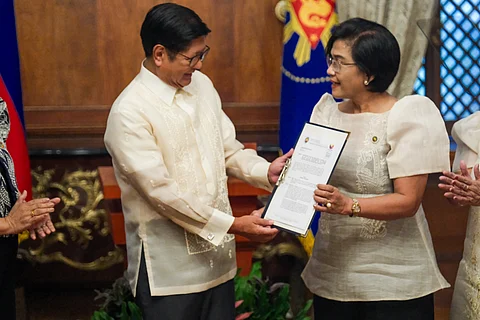
- NEWS
- the EDIT
- COMMENTARY
- BUSINESS
- LIFE
- SHOW
- ACTION
- GLOBAL GOALS
- SNAPS
- DYARYO TIRADA
- MORE

President Ferdinand Marcos Jr. on Tuesday called the passage of Republic Act 12124, or the Expanded Tertiary Education Equivalency and Accreditation Program (ETEEAP) Act, a “dream come true” as officials presented him with the measure’s implementing rules and regulations (IRR).
This new measure was signed by the President in March which allows Filipino professionals to earn a Bachelor’s degree without attending classes or a formal education setting.
It also enables degree holders to apply for equivalency and accreditation of prior and work-based learning up to the second degree as long as the sources of learning are related to the second degree being sought under the ETEEAP.
Marcos recalled that the ETEEAP started as an executive order and became a law.
“Finally we have institutionalized what we have been dreaming to be able to do for many, many years. Because after all, we all understand learning is not confined to the classroom. Often, the most important lessons are learned in the workplace, on shop floors, helping run a family business,” he said.
With the signing of the IRR, Marcos said “experience is just as valuable as a formal education.”
Marcos noted that some Filipinos get into tough situations where they need to put the needs of their families first rather than attend school.
“Through this Act, we now have a clear and structured way to recognize the prior learning of individuals—be it from years of work or because they have taught themselves these skills—and match that with an academic equivalency,” he said.
The ETEEAP also pushed higher education institutions to be more inclusive, supporting Filipinos seeking to have a lifelong career in their chosen work.
“It acknowledges that learning is not always linear, and intelligence takes on many forms,” he said.
“It supports caregivers, mechanics, technicians, and entrepreneurs—people who have long proven their skill, but who now get the recognition that they properly deserve,” he added.
Marcos emphasized that with the opportunities given to professionals, this will lead to the development of stronger industries with a more competitive workforce therefore creating a more inclusive path to progress.
The Chief Executive urged the public to never stop dreaming as life is a “lifelong learning”.
“The true measure of wisdom is your ability to face challenges to fulfill your dreams. I believe you are proof that there is no limit to what every Filipino can achieve,” he said.
Under the measure, Filipinos who are 23 years old and above and have completed a secondary school program with proof of a high school diploma or an Alternative Learning System Accreditation and Equivalency Assessment and Certification which states that the individual is qualified to enter college can apply for the ETEEAP.
Meanwhile, professionals seeking an academic degree program must have five years of aggregate work experience related to the course they are pursuing, provided that they may submit documentation of relevant training programs and other form of formal, non-formal, and informal learning, as may be required by the deputized Higher Education Institution (HEI) including national Certificates or Certificates of Competency issued by the Technical Education and Skills Development Authority (TESDA).
